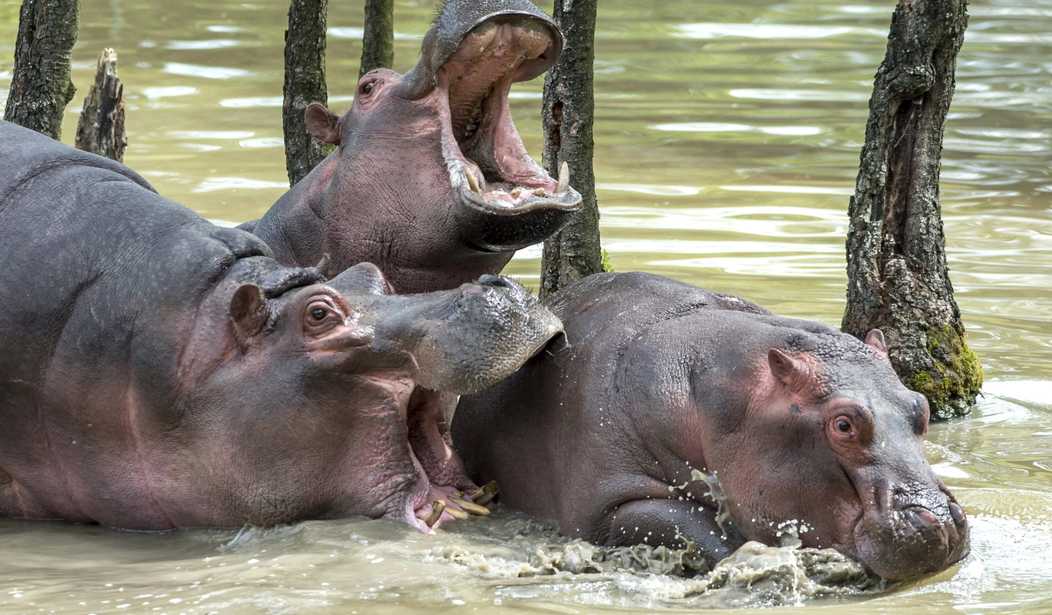Americans dine primarily on four kinds of meat: poultry, pork, beef, and lamb/mutton. But you might be surprised to learn just how close tossing hippopotamus steaks, ribs, and burgers onto the grill was to becoming a normal part of our culture.
There was a major meat shortage in 1910. The price of beef skyrocketed due to an incoming flood of immigration and the massive population boom that came with America’s growing cities. Farmers simply couldn’t keep up with the rising demand for beef.
So Representative Robert F. Broussard of Louisiana proposed the “American Hippo Bill.”
The law would have set aside $250,000 to import hippopotamuses from Africa to be unleashed into the marshlands of Florida, Mississippi, and of course, Louisiana. In theory, the wild hippos would feast on the invasive water hyacinth that were clogging the rivers of the Bayou State, clearing the way for native flora and fauna to thrive, and would be the broad-backed, free-range meat source that would solve the severe beef shortage.
Clean rivers and all of the “lake cow bacon” that you can eat: sounds awesome, right? Wrong. Not only are hippos incredibly aggressive animals that attack and kill humans without any provocation, invasive hippo populations are an absolute ordeal and a half to deal with. When infamous drug lord Pablo Escobar’s estate was taken by the Colombian government, the four hippos from his personal zoo were released into the lagoon beside his compound because they were too dangerous to be captured and relocated. Now there could be up to 40 of Escobar’s legacy hippos thriving in the rivers of Colombia, and they aren’t going anywhere anytime soon.
Initially there was plenty of support for the American Hippo Bill, including from former President Theodore Roosevelt, and the bill was praised in the New York Times and newspaper editorials nationwide. Proponents were quick to note other success stories of importing foreign animals to the United States: a booming ostrich farm near Pasadena; how the federal government introduced Russian reindeer to Alaska as a reliable source of meat; and how American farming wouldn’t be what it was without the European livestock brought along with the nation’s settlers. In fact, there were also attempts to import giraffes, antelopes, elephants, and rhinoceroses to the U.S., too — but none of those ideas received nearly as much momentum as the hippopotamus plan did.
If everyone was impressed with the notion of snacking on hippo jerky, why didn’t it happen? Eventually lawmakers became skeptical of the idea, and the Department of Agriculture rallied against the proposal by asserting that useless bogs and marshlands should be converted into cow pastures, and that eating hippo meat is weird. The American Hippo Bill just barely failed the vote, and the delightfully wacky concept fell into obscurity.
Farmers ended up solving the meat crisis by taking the Department of Agriculture’s advice: they terraformed swampland for cattle to graze on, and found ways to pack in more animals per plot of land in an attempt to get more meat to the market.
Just imagine how America would be if the federal government had released breeding populations of African hippopotamuses into the wetlands of the Gulf Coast. First, we might actually have a taste for hippo meat and think nothing of it. Have you ever wondered why your local big brand grocery store doesn’t carry venison? It’s not because Americans don’t enjoy deer meat, but because by law, the USDA must inspect the animals before they are butchered, and the few USDA slaughterhouses that process deer mostly send their limited supply to restaurants. If the hippo ranching trend had started over 100 years ago and the USDA regularly processed these amphibious animals, a cold cut hippo sandwich might be the norm by now. Getting hippos ready for the butcher was a concern back in 1910 — prospective southern hippo ranchers weren’t sure if they could ship these massive 3,300 lb. animals to stockyards in Chicago as they would cattle.
Had the American Hippo Bill passed, I believe these deadly beasts would’ve permanently ruined the bayous and swamps they would be released in. While they may have consumed the invasive, river-choking water hyacinth plants that plague the waters of Louisiana, a never-ending problem that the state spends $2M dollars each year to eradicate, these nasty creatures would’ve caused so many problems that the locals would gladly pay twice that to get back the flowers for the hippos.
In addition to the often-lethal attacks on people and livestock, the resettled hippos would have bred like rabbits because they have no natural predators here. The impending population explosion would’ve made it far more difficult for native wildlife to compete for the same natural resources as well, especially since an adult hippopotamus consumes around 88 lbs. of food each day, and they have been known to raid farmland in Africa for extra nourishment.
Hippos can also carry diseases that kill livestock, and the large amount of feces they produce has been known to promote extreme algae growth, which depletes the oxygen levels of the water, which in turn results in a large amount of suffocated fish. Personally, I’m not going to be persuaded that the novelty of enjoying a double hippo burger is worth all of that trouble.
Would the American Hippo Bill have been the end of the United States as we know it? No, but some things would’ve been pretty different from the America we know and love — though I can certainly think of worse bills that have been passed in the last eight or so years.









Join the conversation as a VIP Member